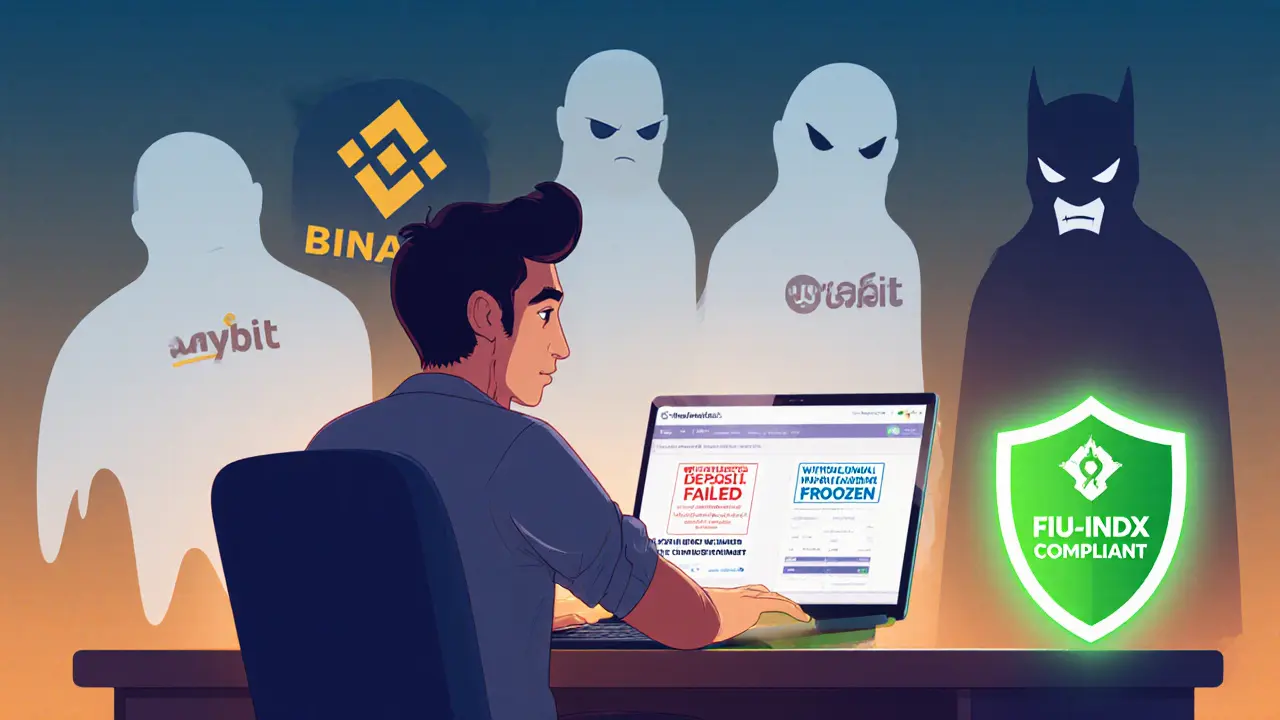Crypto Exchange Compliance Checker
Check Exchange Compliance
Verify if a crypto exchange is compliant with Indian regulations before trading.
If you're trading crypto in India, picking the wrong exchange isn't just a bad choice-it could cost you everything. You might think all platforms are the same, but that’s not true. Some exchanges are legally risky, others are security disasters, and a few are holding your money hostage with no way out. As of 2025, Indian regulators are cracking down hard on platforms that ignore local rules. If you’re using one of these, you’re playing with fire-and you might not even know it.
Why compliance isn’t optional
The Financial Intelligence Unit of India (FIU-IND) is the gatekeeper. It doesn’t issue licenses, but it does enforce reporting rules. Any crypto exchange handling Indian rupees (INR) must register with FIU-IND and report all transactions. If they don’t, they’re breaking the law. And when they break the law, Indian authorities don’t just fine them-they freeze accounts, block bank transfers, and even launch investigations into users. You might be wondering: "But I’m just buying Bitcoin. Why should I care about their paperwork?" Here’s why: if the exchange gets penalized, your INR deposits vanish. Your withdrawals get stuck. And if the platform shuts down or gets hacked, you have zero legal protection. Indian banks won’t help you. The police won’t help you. The government won’t help you-unless you used a compliant platform.Binance: Global giant, local problem
Binance is the world’s biggest crypto exchange. It’s tempting to use it because of low fees and hundreds of coins. But in India, it’s a red flag. In 2023, FIU-IND fined Binance over $10 million for failing to register and report user data. Since then, Binance has stopped accepting INR deposits through most Indian payment channels. If you’re still using Binance to trade INR, you’re likely hitting dead ends-deposits failing, withdrawals stuck, customer support ghosting you. Worse, Binance doesn’t provide tax reports that match India’s rules. You’re expected to track every trade, every transfer, every swap manually. With India’s 30% capital gains tax and 1% TDS on sales over ₹50,000, that’s a nightmare. And if the Enforcement Directorate (ED) starts looking into suspicious activity, your Binance account could trigger a money laundering probe-even if you did nothing wrong.Bybit: High risk, no safety net
Bybit is another global exchange popular among Indian traders for its leverage trading and futures contracts. But here’s the problem: Bybit has been fined millions by FIU-IND for the same reasons as Binance-no registration, no reporting, no compliance. Indian banks have cut off Bybit. Your UPI or NEFT transfers might work once, then suddenly stop. No warning. No explanation. And if something goes wrong? There’s no Indian customer support team. No local office. No legal recourse. If your account gets frozen or your funds disappear, you’re on your own. Indian courts won’t recognize Bybit’s terms of service as binding under Indian law. You’re essentially trading on a platform that operates outside the country’s financial system-and that’s a huge risk.
WazirX: The 0 million disaster
WazirX was India’s biggest homegrown exchange. With 6 million users and $5.4 billion in monthly volume, it felt safe. It even had ties to Binance and the Blockchain India Fund. But in July 2024, everything collapsed. A hacker broke into WazirX’s multi-signature wallet and stole $230 million in crypto. That’s not a typo. Two hundred and thirty million dollars. And here’s the worst part: WazirX hasn’t returned the money. Instead, they’ve been restructuring-while holding onto user funds. Users report emails going unanswered. Withdrawal requests stuck for months. No clear timeline. No transparency. Even worse, WazirX still operates. You can still log in. You can still trade. But you can’t withdraw your INR or crypto without jumping through endless hoops. Many users are trapped. And since WazirX isn’t fully compliant with FIU-IND, there’s no regulatory body stepping in to force them to pay you back.What happens when you use a non-compliant exchange?
Using an exchange that ignores Indian rules doesn’t just put your money at risk-it puts your legal safety at risk too.- Banks block your money: If the exchange isn’t FIU-IND registered, banks classify it as high-risk. Your UPI, IMPS, or NEFT transfers get rejected without warning.
- No tax help: You get zero reports. Zero summaries. Zero support for filing your 30% capital gains tax or 1% TDS. You’re forced to manually track every trade across wallets, which is nearly impossible without specialized software.
- No customer support: Time zones, language barriers, automated bots-you’re stuck. If your account is frozen, there’s no escalation path.
- ED investigations: Even if you’re innocent, using a non-compliant exchange can trigger a money laundering probe. The Enforcement Directorate doesn’t care if you didn’t know the rules. They see foreign exchanges, large INR flows, and they investigate.
- No insurance: Unlike banks, crypto exchanges don’t have deposit insurance. If they get hacked or vanish, your money is gone forever.

What to look for instead
You don’t have to give up crypto. But you do need to be smart. Stick to platforms that have proven they follow Indian rules. CoinDCX, CoinSwitch Kuber, ZebPay, Unocoin, and Bitbns are the safest bets right now. They all:- Register with FIU-IND
- Accept INR deposits via UPI and bank transfers
- Provide tax reports aligned with Indian law
- Have local customer support teams
- Use multi-signature wallets and cold storage
How to check if an exchange is safe
There’s no official list from FIU-IND. But here’s how to protect yourself:- Check their website: Look for "Compliant with FIU-IND" or "Registered with FIU-IND" in the footer or legal section.
- Test a small deposit: Send ₹500 via UPI. If it works, great. If it fails or gets reversed, walk away.
- Look for tax reports: Can you download a CSV or PDF showing your buy/sell history with timestamps and INR values? If not, avoid it.
- Search news: Type "[exchange name] + FIU fine" or "[exchange name] + hack India" into Google. If you see headlines about penalties or breaches, run.
- Ask the community: Join Indian crypto Telegram groups or Reddit threads. Real users know who’s holding funds and who’s responsive.
The bottom line
India’s crypto market is huge-over 15 million people trade. But the rules are still being written. That means the safest path isn’t the flashiest, the cheapest, or the one with the most coins. It’s the one that follows the law. Avoid Binance, Bybit, and WazirX. Not because they’re evil. But because they’ve shown they don’t care about Indian users’ safety. Your money, your taxes, your legal peace of mind-they’re not priorities for these platforms. Stick with exchanges that have skin in the game. That have local offices. That answer your calls. That file reports. That don’t vanish when things go wrong. That’s not just smart trading. That’s protecting your future.Is crypto trading legal in India?
Yes, trading cryptocurrency is legal in India. You can buy, sell, and hold crypto without breaking any law. But crypto is not legal tender-it’s treated as property for tax purposes. The real risk comes from using exchanges that don’t follow Indian regulations, not from trading itself.
Can Indian banks block my crypto transactions?
Yes. Banks classify non-FIU-IND compliant exchanges as high-risk. If you try to send INR to Binance or Bybit, your UPI or NEFT transfer may be rejected without notice. Even if it goes through once, future transfers could be blocked. Compliant exchanges like CoinDCX and ZebPay have direct banking partnerships, so transfers work reliably.
Do I have to pay tax on crypto profits in India?
Yes. India taxes crypto profits at 30%, regardless of how long you held the asset. Plus, a 1% TDS is deducted on every sale over ₹50,000 in a financial year. You’re responsible for tracking your trades and filing taxes. Exchanges that don’t provide tax reports put the entire burden on you-increasing your risk of errors or audits.
What should I do if my funds are stuck on WazirX?
If your funds are stuck on WazirX, you’re not alone. Thousands of users are in the same situation. Contact their support, but expect delays. File a complaint on the National Consumer Helpline portal. Consider joining user groups pushing for accountability. Unfortunately, there’s no guaranteed way to recover your money. The best defense is avoiding platforms with a history of poor security and lack of transparency.
Can the Enforcement Directorate (ED) investigate me for using Binance?
Yes. The ED investigates crypto transactions linked to non-compliant exchanges, even if you didn’t know the rules. If your account shows large INR inflows to Binance or Bybit, it can trigger a money laundering probe. The ED doesn’t need proof of criminal intent-they only need to show the transaction path involved a non-compliant platform. Using a FIU-IND registered exchange is the best way to avoid this risk.
Are Indian exchanges safer than international ones?
Generally, yes. Indian exchanges like CoinDCX and ZebPay are more likely to comply with FIU-IND, have local customer support, and provide tax reports. International exchanges like Binance and Bybit often ignore Indian rules to avoid compliance costs. That makes them faster and cheaper-but also riskier. For Indian users, local platforms offer more protection, even if they have fewer trading pairs.




19 Comments
Kirsten McCallum
Compliance is a myth. Governments control money. Crypto is freedom. You're trading liberty for paperwork.
Henry Gómez Lascarro
Oh wow, another fear-mongering guide from someone who thinks regulation equals safety. Let me guess-you also think wearing seatbelts makes you immune to car crashes? Binance doesn't need FIU-IND's stamp to be legitimate. The Indian government doesn't own your wallet. If you're too scared to use a global exchange because some bureaucrat says so, maybe you shouldn't be trading at all. The real scam is believing that centralized oversight protects you. It just makes you easier to track, tax, and control. And don't get me started on 'compliant' Indian exchanges-they're all cozy with the state. They report everything. They hand over your data. They're the ones who'll freeze your account because you bought too much ETH in one month. At least Binance doesn't care who you are. It just works. And if your money vanishes? That's the price of freedom. Not everyone wants to be a compliant citizen. Some of us want to be free.
Will Barnwell
Ugh. This post is so basic. You didn't even mention that CoinDCX had that one outage in Feb 2025 where they lost 0.3% of user funds due to a misconfigured hot wallet. And ZebPay? They had a 3-day withdrawal freeze last year because their KYC vendor went bankrupt. And you call these 'safe'? Please. The only thing 'safe' is not using any exchange at all. Just hold your BTC in a cold wallet and use P2P. At least then you're not trusting some Indian startup with your life savings. Also, 30% tax? That's robbery. No other asset class gets taxed like this. Why don't you write a post about how the Indian government is screwing over crypto users instead of just shaming exchanges?
Lawrence rajini
Love this breakdown! 🙌 Seriously, so many people don’t realize how dangerous non-compliant exchanges are. I used Bybit for a while and my UPI got blocked mid-trade-no warning, no refund. Switched to CoinDCX and life changed. Tax reports? Check. Support that actually replies? Check. No panic attacks before bedtime? Double check. 🚀 Stay safe out there, fam!
Matt Zara
There’s truth here, but let’s not villainize global platforms. Binance and Bybit didn’t wake up one day and decide to ignore India. They were flooded with users overnight, and compliance is expensive. The real issue? India’s regulatory framework is still in flux. No one knows what’s coming next. Maybe the solution isn’t avoiding global exchanges, but pushing for clearer rules. We can’t have it both ways-wanting access to global liquidity while demanding foreign firms jump through our bureaucratic hoops. Let’s advocate for clarity, not fear.
Jean Manel
Wow. Another Indian crypto victim narrative. Let me guess-you also cry when your Netflix password gets revoked? If you can’t handle the risk of using a global exchange, don’t trade. This post reads like a government propaganda pamphlet. WazirX got hacked? That’s what happens when you trust a startup with $5B in volume and no real security team. Binance? They’re the largest exchange in the world. You think they care about your ₹50,000 deposit? They don’t. And frankly, you shouldn’t care about them either. You’re not a customer-you’re a data point. The only safe exchange is the one you control. Cold wallet. No middleman. No tax reports. No FIU-IND. No crying.
William P. Barrett
There’s a deeper question here: Is safety the same as control? The Indian state wants you to trust only platforms it has vetted-not because they’re better, but because they’re easier to monitor. We’ve traded autonomy for the illusion of security. Binance doesn’t owe you tax reports. It doesn’t owe you customer support. It owes you liquidity and uptime. If you want a bank with crypto features, fine-use CoinDCX. But don’t pretend that’s the only moral choice. The real risk isn’t the exchange. It’s believing that someone else-regulator, platform, or post-can protect you from the consequences of your own decisions.
Cory Munoz
I appreciate this guide. Really do. As someone who lost money on a sketchy exchange last year, I wish I’d read this sooner. The part about testing a ₹500 deposit? Genius. I didn’t think of that. Also, the tax report point-so many people get audited because they have no records. Just… be careful out there. Crypto’s wild, but you don’t have to be reckless.
Jasmine Neo
India’s crypto regulations are the most advanced in the developing world. Anyone using Binance or Bybit is either naive or deliberately undermining national financial sovereignty. These platforms are foreign entities exploiting our market without contributing to our economy. They don’t pay taxes, they don’t hire local staff, they don’t support our startups. Meanwhile, Indian exchanges are building infrastructure, creating jobs, and complying with laws. If you’re still using Binance, you’re not a crypto enthusiast-you’re a colonial mindset with a wallet. Stop enabling foreign exploitation. Use CoinDCX. Support India. End of story.
Ron Murphy
Interesting take. I’ve used both CoinDCX and Binance. The Indian ones are slower, but reliable. Binance is faster, but the INR gateway is a mess. I’ve had deposits fail 3 times. Still, I use it for altcoins. For INR pairs, I stick with ZebPay. The tax reports are a pain, but at least I have them. FIU-IND compliance isn’t perfect, but it’s better than nothing. Also, WazirX’s collapse was a disaster-but it was also a wake-up call. The market needed this.
Prateek Kumar Mondal
Bro this is truth. I used WazirX till July 2024. Money stuck. No reply. Now I use CoinSwitch. UPI works. Tax report auto generated. No drama. India needs more of this. Stop trusting global apps. Local ones are better for us.
Nick Cooney
Wait-so we’re supposed to trust Indian exchanges because they're 'compliant'? Funny. They also have the same team that got hacked in WazirX. And CoinDCX’s 'compliance' means they report every single trade to the government. That’s not safety. That’s surveillance. You want freedom? Use a cold wallet. You want convenience? Use a platform that doesn’t care who you are. Don’t trade your privacy for a tax report that takes 3 weeks to generate. This post is the digital equivalent of a bank manager saying 'We only lend to people with good credit.' Yeah, and that’s why people still get robbed.
Saurav Deshpande
FIU-IND is a front. The real power is with the Enforcement Directorate. They don’t care about compliance-they care about control. Every 'compliant' exchange is a honeypot. They collect your data, your transaction history, your identity. Then they hand it over to the ED. Binance may be chaotic, but at least it doesn’t know your Aadhaar number. The real danger isn’t the exchange-it’s the state using compliance as a tool to track you. WazirX didn’t fail because of a hack. It failed because it gave too much data. The only safe exchange is the one you don’t register with.
Paul Lyman
Y’all need to stop overcomplicating this. If you’re in India and trading crypto, use CoinDCX or ZebPay. Period. Don’t stress about Binance’s 'freedom'-it’s not freedom if your money vanishes and you can’t even call support. I’ve been trading since 2021. I lost 6 months of savings on a fake exchange. This guide saved me. You’re not weak for choosing safety. You’re smart. Keep it up 💪
gurmukh bhambra
Wait, so you’re saying WazirX stole $230M and no one’s in jail? And you think CoinDCX is safe? They’re owned by the same investors who ran the fake NFT platform last year. This is all a scam. The government is using this to push people into centralized exchanges so they can track every transaction. Binance is the only real option. If you’re not using it, you’re part of the problem. They don’t report to anyone. That’s why they’re still alive. Compliant = controlled. That’s the truth they don’t want you to know.
Sunny Kashyap
Why even use exchange? Just buy from someone on Telegram. No tax. No reports. No hassle. Who needs all this paperwork? I made 5 lakh last year. No one asked me anything.
james mason
Oh, so now we’re supposed to trust Indian exchanges because they have 'local support'? How quaint. I’m sure the guy answering your ticket on WhatsApp at 2 AM is a certified financial advisor. Meanwhile, Binance has 24/7 multilingual support, AI chatbots, and institutional-grade security. You’re trading global infrastructure for a local startup with a 2023 LinkedIn page. The only thing 'safe' here is your ignorance.
Anna Mitchell
Thank you for writing this. I was so scared to start trading because I didn’t know who to trust. This helped me feel confident using CoinSwitch. I’m still nervous, but at least I know I’m not risking my life savings on a ghost platform. 💛
jummy santh
As a Nigerian trader who has navigated similar regulatory chaos, I must commend this piece. The parallels between Nigeria’s CBN restrictions and India’s FIU-IND framework are striking. In both jurisdictions, the state seeks to control financial innovation under the guise of protection. Yet, the most resilient users are not those who comply blindly, but those who understand the architecture of risk. I use Binance for liquidity and CoinDCX for INR on-ramps-hybrid strategy. Compliance is not submission; it is tactical adaptation. The real enemy is not the exchange, but the illusion that safety can be outsourced. Trust your own due diligence. Verify. Test. Observe. Then act. The rest is noise.